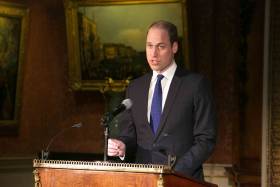Displaying items by tag: Shipping fight WildlifeTrafficking
#SaveElephants - Leaders of the global transportation industry in London this week signed a new declaraction committing major steps to fight criminal wildlife trafficking that has been hailed by the Duke of Cambridge as 'a game changer in the race against extinction.'
Hans Norén, Stena Line’s UK Chairman joined 40 CEOs, Chairmen, and other leaders of airlines, shipping firms, port operators, customs agencies, intergovernmental organisations and conservation charities from around the world to become the founding signatories of the Declaration of the United for Wildlife International Taskforce on the Transportation of Illegal Wildlife Products.
The Buckingham Palace Declaration is the result of a year's worth of meetings, research, and coalition building by the United for Wildlife Transport Taskforce, convened by The Duke of Cambridge and chaired at His Royal Highness's request by Lord Hague of Richmond. Transport representatives on the Taskforce include companies and organisations based in China, USA, UAE, Kenya, the UK and Denmark.
Speaking at the signing of the declaration, The Duke of Cambridge said: "If we allow current trends to continue, there will be no African elephants or rhinos left in the wild by the time my daughter Charlotte reaches her 25th birthday. The poaching crisis is bringing violence, death, and corruption to many vulnerable communities. It threatens to rob future generations of their livelihoods in those regions where wildlife tourism is the core of local economies.
"But this crisis can be stopped. We know where the animals are that we need to protect. We know where the markets for wildlife products are and where awareness, education, and law enforcement need to be improved. And with the Buckingham Palace Declaration being signed today, global transport leaders are saying we know many of the ways wildlife products are being moved from killing field to market place.
"By implementing these commitments the signatories can secure a game changer in the race against extinction. I thank them for their commitment and I invite any other company in the industry to sign up to the Buckingham Palace Declaration and play their part in the fight against the poaching crisis."
Hans Norén said: “Stena Line is fully committed to the vision and dedication of the United for Wildlife International Taskforce and this historic declaration is an extremely important step in helping to put the mechanisms in place to help reduce and hopefully eradicate this illicit trade.
“Over the last 15 months it has been very inspiring to see the collaboration of some of the world’s leading transport organisations and at Stena Line we undertake to do everything within our power to help deliver on the commitments that have been made at the Buckingham Palace Declaration.”
The Buckingham Palace Declaration commits signatories to eleven commitments that will raise standards across the transportation industry to prevent traffickers from exploiting weaknesses as they seek to covertly move their products from killing field to marketplace. The commitments focus on information sharing, staff training, technological improvements, and resource sharing across companies and organisations worldwide. They will also see the world's leading transportation firms assisting those in poorer nations who are in need of expertise and new systems.
The work of the United for Wildlife Transport Taskforce has been strongly supported not only by the transport sector but a number of intergovernmental agencies. Among them the World Customs Organisation, United Nations Development Programme and importantly the Convention on Illegal Trade in Endangered Species of Flora and Fauna (CITES) – the world's regulatory instrument on trade in endangered species.
To learn more about United for Wildlife visit: http://www.unitedforwildlife.org/






























































